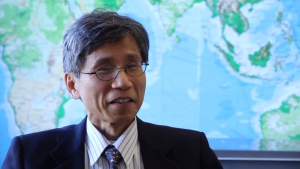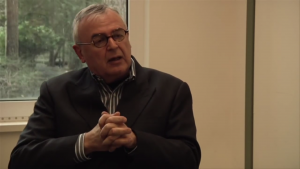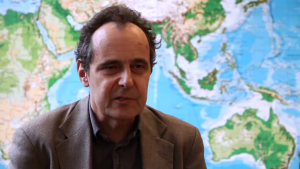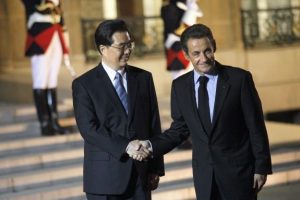Key Issues Facing East Asia – (Video Interview with Dr. Tun-jen Cheng)
Memo #67 – In this interview, Dr. Tun-jen Cheng discusses a range of key issues facing East Asia today, including religion, governance, economics, and politics. When speaking about a religious revival in China, Dr. Cheng notes that Christianity is accepted by many new middle class urbanites as a source of inspiration and a symbol of modernity and greatness. Dr. Cheng then gives an account of the challenges facing East Asian democracies. Most notably, he mentions the public’s complaints about the shortage of horizontal accountability – the checks and balances between various branches and units of government. Nonetheless, he concludes that East Asian democracies are quite robust when compared to systems in Southeast Asia and the Middle East.
Former Canadian Ambassador to Japan on the Crisis (Video Interview)
Memo #66 – In an exclusive interview, Joseph Caron discusses the crisis in Japan. As former Ambassador to Japan and Honorary Professor at the Institute of Asian Research, Caron is in a position to evaluate bilateral relations between Canada and Japan following the recent earthquake, tsunami, and problems at the Fukushima Dai’ichi nuclear power plant. Caron notes that the government of Canada has already offered a great deal of support to Japan and may be asked for their expertise on such things as urbanization and construction codes once rebuilding begins. Moreover, he hopes that Canada and Japan can sustain strong political relations during what may be a period of political uncertainty in Japan.
UBC Japanese Geography Expert – Full Video Interview
Memo #65 – UBC Japanese geography expert, Dr. David Edgington, compares the earthquake that struck Japan on March 11, 2011, dubbed the “Sendai Regional Earthquake,” with the Great Hanshin Earthquake of 1995. In his view, the Japanese government’s response to the Sendai Regional Earthquake is a textbook example of emergency response, indicating there have been lessons learned from Kobe.
Tough Choices Ahead for Global India
Memo #64 – This is a time of great tumult in the Middle East. All major global powers are struggling with tough choices to strike a balance between their values and strategic interests in responding to the unfolding crisis in Libya. India is no exception but it is particularly under the spotlight as it assumed the non-permanent membership of the United Nations Security Council (UNSC) in January.
Sino-European Hope for the G20 in 2011
Memo #63 – Is the G20 still useful? What can we expect of it this year? Analysts in Canada and the US are often quick to discount the G20 process as meaningless summitry among too many countries focused on widely divergent domestic agendas and embroiled in pre-electoral politics. Ian Bremmer and Nouriel Roubini both call this a G-zero situation.
Espoirs Sino-Européens pour le G20
Memo #63 – Le G20 a du mal à s’affirmer comme instance politique capable de résoudre énergiquement les risques systémiques, notamment financiers, et déçoit donc ceux qui en espéraient le plus.
Fully Ordained Nuns in Theravada Buddhism
Memo #62 – There are no fully ordained nuns, or Bhikkhunis, in Theravada Buddhism. Last year, after 35 years in the West, the Theravadin Thai Forest Tradition found that the ordination of nuns had become a flashpoint. The Western monks are willing to adapt, but require consensus with senior conservative monks in Thailand. In the end, the issue of nuns’ ordination may be decided by senior Canadian monks.
East Asia’s Population Crisis: Solutions
Memo #61 – Japan reported missing 230,000 centenarians in September 2010. This dramatic news highlighted among other things, the rapid aging of Japan’s population and its low total fertility rates. For the past decade, demographers have called attention to the impending population crisis in East Asia. Several countries saw fertility rates plummet to well below 2.1 births per woman – the rate required to sustain a population, assuming all other factors remain relatively constant. The problem has been compounded by increased life expectancy and the lack of immigration flows to compensate for birth and death rates.
Thailand’s Red-Shirts: One Year Later
Memo #60 – March 12, 2011 will mark the first anniversary of Thailand’s red-shirt protesters’ massive street campaign in Bangkok that ended in some of the worst political violence in modern Thai history. 91 people were killed and over 1,800 were injured in a military crackdown that resembled more of a civil war than a restoration of order. This was mainly due to the appearance of mysterious black-clad men on the side of the protesters who engaged the Thai army with automatic rifles and grenade launchers.
Is China the Next Domino?
Memo #59 (Part 2) – Authoritarian regimes seem to be crumbling almost daily. Will China go the way of Middle Eastern dictatorships?
The similarities are obvious. China relies on harsh measures to put down calls for democratic reform. And it is plagued by a huge gap between rich and poor, rampant corruption, rising prices of basic food stuffs, and high unemployment among recent university graduates.






